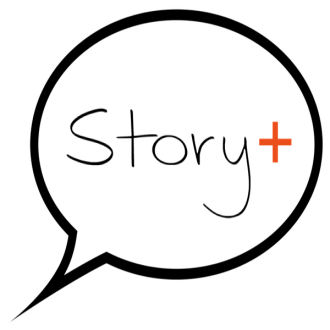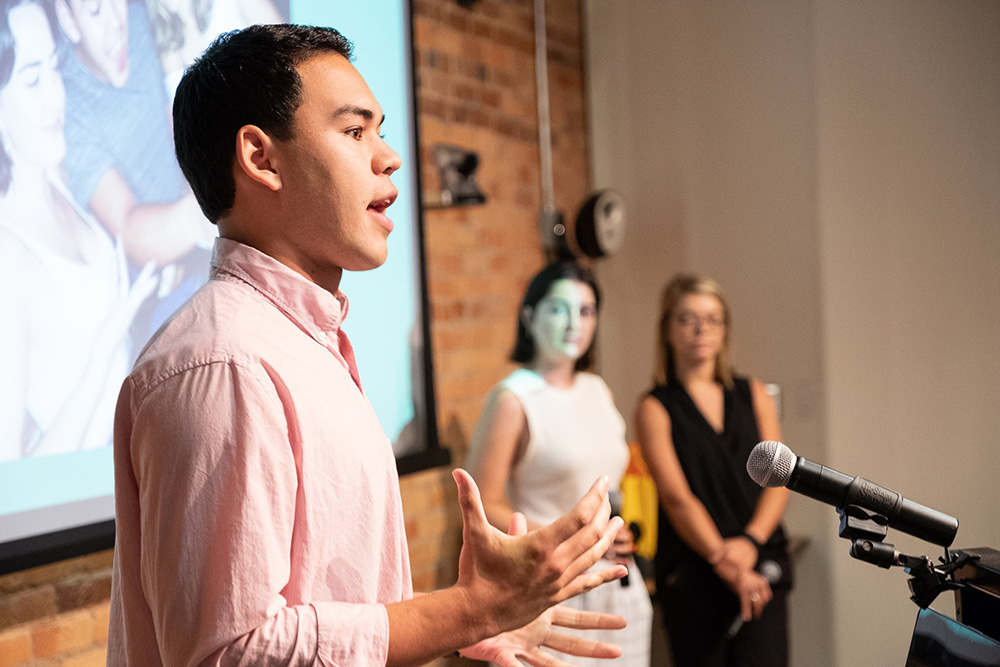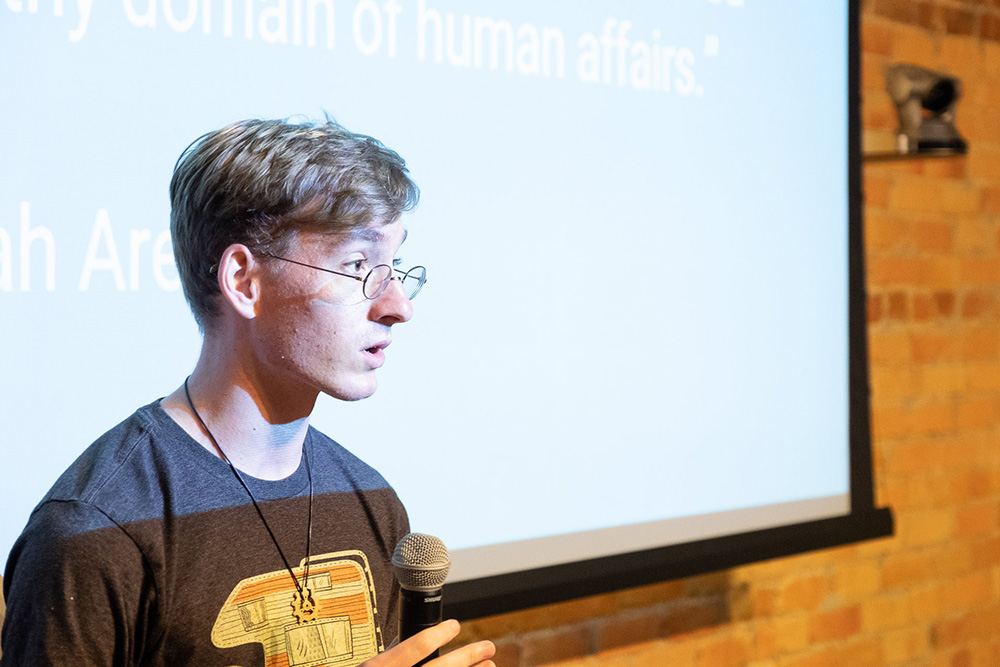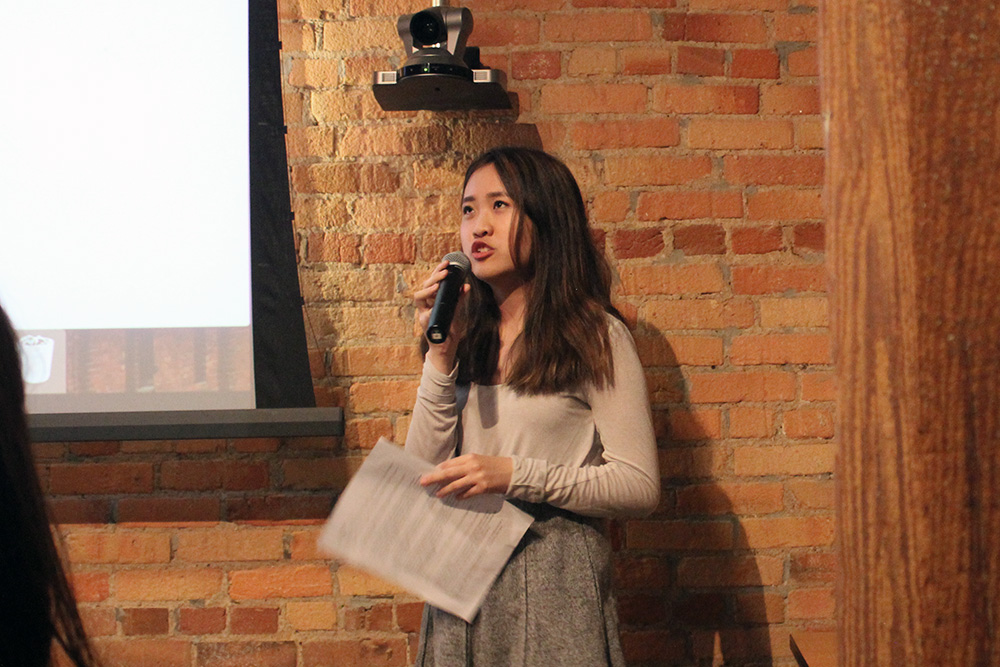Story+ Projects Demonstrate Vitality of Humanistic Research and Thinking

On June 27, Duke’s Franklin Humanities Institute hosted an overflowing crowd of faculty, staff, students and community members for the Story+ Summer Research Symposium. Nine teams presented their outcomes and shared personal experiences from the past six weeks spent digging into archives, discovering untold stories, developing curricula, designing graphic memoirs and interviewing coal miners in Appalachia.

Story+ is offered through the Franklin Humanities Institute and Bass Connections, in partnership with Duke Libraries and Versatile Humanists at Duke.
Edward Balleisen, Duke’s vice provost for interdisciplinary studies, gave closing remarks. “I think we do best at Duke when we find a way to facilitate the capacity of students, faculty and staff to pursue questions to which we don’t already have the answers,” he said. “This symposium is a stunning example of that Duke in action.”
Student Action with Farmworkers Documentaries
- Project Sponsor: Joanna Welborn, SAF
- Graduate Mentor: Eladio Bobadilla, History
- Undergraduate Students: Ethan Ahuna, Mary McCall Leland, Kezia Matson
- Project Outcomes: This team worked with Student Action for Farmworkers to produce a three-part video series featuring oral history interviews with farmworkers. Check out Part I: Farmworkers Are... and Part II: Telling My Truth: Farmworkers Share Their Stories, and stay tuned for Part III.

What kind of story do we want to tell? We started by going through the archives, then we went into field to get a better perspective. Next we interviewed SAF employees. —Mary McCall Leland
Coal & America: Stories from the Central Appalachian Coalfields
- Project Sponsor: Jonathon Free, Duke University Energy Initiative
- Graduate Mentor: Alex Yoshizumi, Environmental Management
- Undergraduate Students: Nicole Lindbergh, Morgan Ruff, Mary Helen Wood
- Project Outcomes: This team traveled to Kentucky to collect oral histories from individuals and families in current and former coal mining communities. Their storytelling work will continue through the 2018-19 Bass Connections project team Coal in America: Chronicling and Analyzing Its Economic and Social History. The stories this team collects will be archived and made publically available. Jonathan Free was also interviewed about the project by West Virginia Public Broadcasting.

Some people would say, ‘You’re giving them a voice,’ but you’re not. They’re welcoming you into their home and they’re teaching you. —Nicole Lindbergh
Remapping the Caribbean: Archives of Haitian & Cuban Migration, Detention & Legal Activism
- Project Sponsor: Laurent Dubois, Romance Studies and History
- Graduate Mentor: Ayanna Legros, History
- Undergraduate Students: Aasha Henderson, Sanha Lim, Alyssa Perez
- Project Outcomes: This team created a digital timeline of the history of the National Coalition for Haitian Rights.

This project was life-changing. It really shifted how I see the world. I came in premed, thinking maybe I’ll look at this [project] with a health perspective, but I was more captivated by policy because what the U.S. passed very much affected people’s lives. I’m thinking about a major shift to International Comparative Studies. I’ve always had a strictly American perspective; I have to remember that the U.S. is one country among many. —Aasha Henderson
Stone by Stone: Who Built the Duke Chapel?
- Project Sponsor: Valerie Gillispie, Duke Libraries, University Archives
- Graduate Mentor: Hannah Ontiveros, History
- Undergraduate Students: Jacob Satisky, Caroline Waring, Gretchen Wright
- Project Outcomes: This team created the website Stone by Stone, which tells the stories of laborers and craftsman who built Duke’s Chapel as well as other structures on West Campus. Valerie Gillispie and Caroline Waring were also featured on WUNC's The State of Things!.

Shorty Cohn did stonecutting work all across the South, and he came to Durham to work on Duke Chapel. He stayed in his mill house after the chapel was done, but he contracted TB. They removed half his ribs, and he kept working. —Jacob Satisky
The Allen Building Takeover @ 50 Exhibit
- Project Sponsors: Valerie Gillispie, Meg Brown, Arianne Hartsell-Gundy, Yoon Kim, Amy McDonald, Hannah Rozear, Duke Libraries
- Graduate Mentor: Ellen Song, English
- Undergraduate Students: Alexandra Kadis, Alan Ko, Zara Porter
- Project Outcomes: This team mapped the layout, format and content for Black Students Matter: Taking Over Allen ’69, an exhibit that will be featured in Perkins Library in 2019. The team also created an accompanying digital exhibit.
- Reflection: Ellen Song

The archives had lots of material from the administration perspective and not much on students’ perspective. It took more research, but we did find stories from white and black students. We felt that the administration had told their story already; we want to tell the students’ stories. —Zara Porter
Preaching and Protest: Sermons from Duke Chapel during the Civil Rights Era
- Project Sponsor: Rev. Luke A. Powery, Duke Chapel, Divinity School
- Graduate Mentor: Peace Lee, Theology
- Undergraduate Students: Sonja Andrews, Liddy Grantland, Naomi Lilly, Brennen Neeley
- Project Outcomes: This team analyzed nearly 100 sermons preached at Duke Chapel during the 1960s to explore the intersections between preaching and public protest during an era of social change.

Medgar Evers was killed four days before Fathers’ Day; there was no mention in the Chapel sermon that Sunday. A week after the 16th Street Church bombing, the sermon was on Jonah and the whale. —Liddy Grantland
Left of Black Story+ Project
- Project Sponsors: Mark Anthony Neal, African and African American Studies; Camille Jackson, Duke Council on Race and Ethnicity; Catherine Angst, John Hope Franklin Center
- Graduate Mentors: Nicole Higgins, English; Allison Raven, History
- Undergraduate Students: Malcolm Brown, Ce’Ondra Ellison
- Project Outcomes: Left of Black is a weekly webcast hosted by Mark Anthony Neal and produced by the John Hope Franklin Center. This team dove into Left of Black’s extensive video archives to unearth interesting stories from previously aired shows that could be turned into online teaching modules for middle and high school students. The team produced four modules (which include videos and lesson plans) that have been gathered in the online repository Left of Black Enrichment.
- Reflections: Nicole Higgins and Allison Raven

This was my first experience working with a team, seeing how ideas unfold and [building] skills in digital editing and lesson plans. —Ce’Ondra Ellison
An Illustrated Memoir of the Global HIV/AIDS Pandemic: The Maria de Bruyn Papers Speak
- Project Sponsors: Kearsley Stewart, Global Health and Cultural Anthropology; Rachel Ingold, Duke Libraries; Maria de Bruyn, Independent Scholar
- Graduate Mentor: Max Symuleski, Computational Media Arts and Cultures
- Undergraduate Students: Brock Foreman, Ashley Manigo, Christina Shin
- Project Outcomes: This team examined the Maria de Bruyn Papers in order to create a zine that explores how narratives about HIV and AIDS have changed from the early-1980s to the present. Each chapter of the zine, HIV & AIDS, A Global Pandemic: Illustrating the Maria de Bruyn Archives, works to debunk popular myths about the virus as well as analyze how it continues to impact populations across the globe today.

We all read through the material and came up with different angles and very different graphic styles, which shows the breadth and depth of this archive. —Christina Shin
Women in Labor Movements
- Project Sponsors: Laura Micham, Kelly Wooten, Duke Libraries
- Graduate Mentor: Claire Payton, History
- Undergraduate Students: Sadia Ayez, Gia Cummings, Elaine Zhong
- Project Outcomes: This team explored the recently acquired Lisa Unger Baskin Collection, which documents women at work, broadly conceived, from the mid-15th century to the mid-20th century. In order to make this large collection of items more accessible to researchers and the public, the team created a digital research guide and a series of online exhibits highlighting materials from the collection related to women, labor and labor organizing.

We learned and practiced a lot of humanities research methods, and we interacted with the materials in a very active way. My exhibit is about prostitution and labor organizing, and I was excited to encounter a lot of materials representing the voices of people themselves. I found very different opinions and perspectives. Sex workers are still fighting against a lot of injustices. Activism and policy require the humanities to understand how they operate. —Elaine Zhong
Appalachian Stories: Young Voices from Madison County, North Carolina
- Project Sponsor: Deborah Hicks-Rogoff, Social Science Research Institute, PAGE Institute
- Graduate Mentor: Summer Dunsmore, Experimental and Documentary Arts
- Undergraduate Students: Cameron Beach, Samia Noor, Nina Wilder
- Project Outcomes: This off-site team spent six weeks in Western North Carolina working with middle school-aged girls in the Partnership for Appalachian Girls’ Education (PAGE) program on multimedia installations honoring two historic schools in Madison County. Members of PAGE presented their projects at the program's annual exhibition at Madison Middle School on July 24.
Learn More
- Read about the Left of Black team and view the website.
- Explore the Stone by Stone website and listen to an interview on WUNC.
- Follow Story+ on Instagram.
Photos by Dean Rhoades (except Allen Building team, which is from Story+ Instagram)